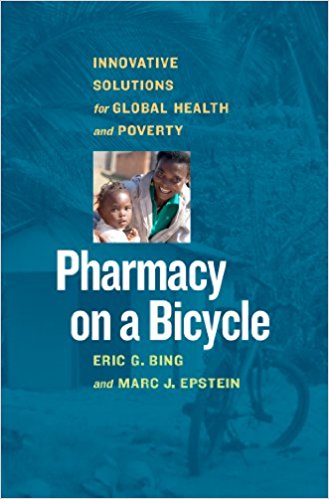
Despite the widespread conviction that the state of the world is deplorable and getting worse by the day, the human race has made measurable, even dramatic progress in some important ways. The collective state of our health is the most telling example. In part because of the eradication of smallpox, the near elimination of polio, and the significant recent progress on HIV/AIDS, humanity in general is living longer and healthier lives. Average life expectancy at birth in India around 1950 was 38 years; today it is 65. In China, it was 41; today it is 77. Over the same period, average life expectancy in the United States has risen from 65 to approximately 80. Numbers can be misleading, but these tell a compelling story.
Building on this amazing success story, major institutions — the United Nations, the U.S. Government, and the Bill and Melinda Gates Foundation, for example — have invested billions of dollars in recent years, targeting specific diseases, promoting the use of vaccines, and building public health infrastructure in developing nations. All these admirable efforts promise to continue the favorable trend in healthcare that has unfolded over the last half-century.
Pharmacy on a Bicycle: Innovative Solutions for Global Health and Poverty, by Eric C. Bing and Marc J. Epstein ★★★★☆
However, there is a hidden dimension in this picture. As Eric Bing and Marc Epstein explain in Pharmacy on a Bicycle, billions of poor people living in rural areas all too frequently fail to gain the benefit of these advances in healthcare. It’s fashionable to look on the world today from the perspective of the cities, but in spite of the massive migration of the last several decades, nearly half (49%) of the world’s population still resides in rural areas. Great numbers of these people live far from transportation hubs, often hours or even days of walking from the nearest road. It’s to these billions of people, nearly all of them desperately poor by American or European standards, that Bing and Epstein turn their attention in their illuminating little book.
Pharmacy on a Bicycle rests on a single, fundamental premise: “Most poor outcomes [in healthcare] are caused not by lack of effective medicines or medical know-how. The ability to prevent and treat many of these diseases inexpensively has been available for a very long time. But getting the right remedies to the right people in the locations where they are needed, in a way they will use them, and at a cost they can afford is continually a challenge. This is not a scientific problem. It’s a business challenge.”
Bing and Epstein argue that humankind has never before been in such a good position to meet this challenge. The costs of many widely-used drugs have fallen dramatically, and scientists have greatly simplified the treatment of many diseases by combining multiple drugs into single capsules or tablets. Extremely cheap diagnostic techniques that provide nearly instant assessments are now available. Through telemedicine, a single well-trained physician can now offer her or his expertise to much larger numbers of patients. The widespread use of clinical checklists and the application of franchising to the healthcare industry have both improved access and lowered costs. And new business models, successfully piloted in many countries, using bicycles, motorcycles, and trained village-level representatives, make it possible for healthcare agencies and for-profit companies to overcome the “last mile problem” that has traditionally limited most of the benefits of the market economy to population centers. “We are now at a tipping point to make lasting global health impacts,” the authors write.
One of the most promising recent developments is the now near-universal access to cell phones; by next year, the number of mobile phones is expected to be greater than the world’s population. “Mobile phones are now being used for patient education and awareness, treatment compliance, health care worker training, data collection, disease and epidemic outbreak tracking, and diagnostic and treatment support.”
Pharmacy on a Bicycle is intended to spark much wider adaptation of these advances by making them more widely known. The book presents a seven-point implementation model called IMPACTS, which encompasses innovation and entrepreneurship, maximizing efficiency and effectiveness, coordinating with partners, accountability, creating demand, task shifting (e.g., empowering nurses to take on some doctors’ responsibilities), and scaling. The book includes an abundance of excellent examples that bring these deadly-sounding prescriptions to life.
Eric Bing is an M.D. who also possesses a Ph.D. in epidemiology and an MBA. He’s the director of global health at the George W. Bush Institute at Southern Methodist University. His co-author, Marc Epstein, is an eminent and much-published professor of management at Rice University in Houston whose previous teaching posts were at the Harvard and Stanford business schools and INSEAD (European Institute of Business Administration).
For further reading
For books on closely related topics, see:
- Narrowing global inequities: a reading list
- Third World poverty and economic development: a reading list
- The top 10 books on the economics of poverty
- A resource list on social enterprise
And you can always find my most popular reviews, and the most recent ones, plus a guide to this whole site, on the Home Page.



























Thanks for the post, Mal. I am working on a brochure for the School of Allied Health–recruiting students kind of piece. So I will soon be head-over-heels in literature on this subject.
Sincerely, Frank C. Dickerson, Ph.D. President: The Written Voice | Narrative Fundraising | High Touch Communication Sr. Counsel: Levasis Not-for-profit Consulting
How to Contact Me . . . 7412 Club View Drive, Suite 200 Highland, CA 92346-3993 888-HIGHTOUCH (888-444-4868) | Direct: 909-864-2798 | E-fax: 509-479-2690
Where to Get More Information . . . Free or Low-cost Counsel for Not-for-profit Organizations: http://www.Levasis.org Academic Research: http://www.TheWrittenVoice.org
Educational Outreach: http://www.NarrativeFundraising.org Marketing & Fund-raising Service: http://www.HighTouchCommunication.com
Date: Thu, 16 May 2013 16:54:14 +0000 To: hightouchdirect@msn.com